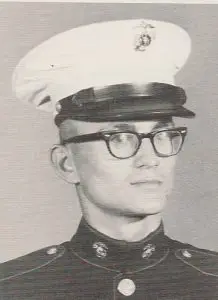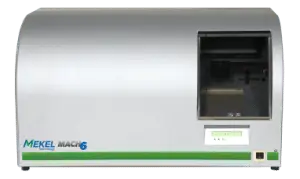The Marine and the Microfiche: Preserving 20 Years of Service

After one conversation with retired United States Marine Corps (USMC) Gunnery Sergeant Joseph Wilk, it was evident that his time in the military was filled with valuable life lessons and experiences. These experiences will be passed down for generations through his impressive storytelling skills (to which I bear witness), but also through the preservation of his military records from microfiche. This Veteran’s Day we take the time to shine a light on Wilk’s service and the journey to digitize his personal military records.
From West Germany to Chicago to Parris Island and beyond
Wilk was six when his family emigrated from West Germany to Chicago, IL. After graduating from Chicago’s Angel Guardian High School in 1969, he joined the Marine Corps and served for 20 years as an administrator on Parris Island, Camp Pendleton, Camp Lejeune and in the Judge Advocate General (JAG) Corps. His duties included anything from ensuring marines received their paychecks to organizing case files for JAG investigations, leaving just enough time to participate in the USMC mounted color guard on weekends. “Because of the high standards of the Marine Corps,” says Wilk, “I learned, first and most importantly, about both my capabilities and limitations as a person.”
While serving, Wilk gained his U.S. citizenship in 1976. Once out of the military, he went on to attended Parks Jr. College (graduating in 1995 with a B.A. in Computer Science with a 94% average; go, Joe!) and worked in the Department of Corrections in Colorado for a number of years. After his retirement, he and his wife began looking into their ancestral roots. Wilk sought out his own military records as a testimony of his early years for future generations. “My wife and I were into genealogy. I wanted a readable copy [of my military records] for my children and grandchildren,” said Wilk. “Around 1990, I requested a copy from the USMC and received it on microfiche.”
At the time, it was common practice for military institutions to transfer their paper records onto microfiche to reduce storage space (one 4×6 inch sheet of fiche normally holds around 30-35 document images). While today’s digital file sharing would have made the transaction of records a (supposedly) simpler process, a copy of the microfiche records was sent to Wilk and included copies of his enlistment contract(s), all assigned commands (including the many educational classes he took while in the Marine Corps), awards and fitness reports.
Going digital
Life got busy and the microfiche sat for nearly 20 years. Later, Wilk picked up the project and requested a paper copy from USMC headquarters. He recalls, “The printed copy was incomplete and many of the pages were unreadable due to poor copier and printer quality. I wanted something of good quality so I looked on the internet for microfiche [viewing] equipment and found it was out of my price range. I noticed that Crowley converted microfiche to digital format so I called and spoke with a rep.”

Due to the small size of the collection (just five fiche or approximately 150 documents), Wilk’s need for digitization harmonized perfectly with a Crowley tenet.*
The fiche were shipped to Crowley Imaging in Frederick, MD and digitized on a Mekel MACH-Series microfiche scanner at 300 dpi. Due to the quality of the film, both bitonal and grayscale images were provided to ensure readability from one version or the other. The images then underwent OCR enhancement for keyword searchability and were converted into a multi-page searchable PDF. All images were provided to Wilk on a flash drive, approved, and the originals returned via mail.
Wilk recounts, “The rest is history. The digitized copy was crystal clear. I was amazed and overjoyed at the results. I don’t know how you folks did it but the quality was superb.”
Secure for future generations (in more ways than one)
We often hear of the “roadblocks” that can come up in genealogy research from poorly kept records, dead-end paper trails and lack of access. Wilk’s forethought into creating a simple and accessible version of his records for current and future generations is a kindness that will continue to be a gift to his family for decades to come. While the digital records are helpful for quick research, the microfiche records are also a valuable back-up that can last for 500 years if stored properly.
For the Crowley Imaging service bureau, it was an honor to participate in the preservation of Wilk’s personal legacy. Commercially, Crowley has worked on large-scale record digitization for several branches of the military within the service bureau, on-site or through the purchase of production-level scanning equipment.
We thank Wilk and the rest of our military – past and present – and their families for their dedication and sacrifices this Veteran’s Day.
Learn more about the digitizing capabilities of Crowley Imaging
For more information on the digital and analog conversion services offered by Crowley Imaging, please visit our website or call (240) 215-0224. General inquiries can be emailed to [email protected]. You can also follow The Crowley Company on Facebook, Twitter, Google+, LinkedIn, Pinterest and YouTube.
*The Crowley Company selects one project annually for pro bono work. Past years have included the Morning Star newspaper for Jefferson County Museum and medical minutes for the Delaware Historical Society. Recommendations for project considerations (must be fewer than 1000 images and benefit a non-profit organization)? Let us know about it!

